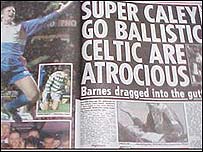When it comes to newspaper headlines, the British never met a pun they didn’t like. Some of the subeditors who come up with these are consummate artists; others should be relieved of their responsibilities and set to more constructive work elsewhere—digging ditches, maybe.
The ne plus ultra of the punning headline came from a story about politician Michael Foot being named to lead a group working towards nuclear disarmament, which ran under one of the world’s all-time great headlines: “Foot Heads Arms Body.”
 That’s often quoted, but rarely with attribution. The inter-net being what it is, some sites say the line came from the Daily Mirror and some that it’s from The Times; if I looked further, it’s likely every newspaper over here would be mentioned sooner or later. It’s possible that somebody made the whole thing up and that headline never appeared anywhere. (If anyone has the facts, I’d love to hear them.)
That’s often quoted, but rarely with attribution. The inter-net being what it is, some sites say the line came from the Daily Mirror and some that it’s from The Times; if I looked further, it’s likely every newspaper over here would be mentioned sooner or later. It’s possible that somebody made the whole thing up and that headline never appeared anywhere. (If anyone has the facts, I’d love to hear them.)
That’s an unusual example not only for its multi-level cleverness, but because it headed a serious news story. Punning headlines appear more often in the travel sections or home sections of the broadsheet papers, where it’s impossible to escape puns such as “Goan Inside” (Goa beyond the tourist areas), “Loch, Stock and Barrel” (loch-side property for sale in Scotland), and “Join the Press Gang” (growing your own olives), to list some I’ve run across recently in broadsheets. I won’t comment on the tabloids; British tabloids are another animal altogether, and I wouldn’t put anything past their editors.
Of course you get punning headlines in the US, but not to the extent you do here. And here, there doesn’t seem to be any requirement that the headline reflect the content of the story. Olives, for example, have nothing to do with press gangs. I once saw the headline “Call of the Wild” on a book review when the reviewed book had nothing to do with the novel Call of the Wild, or with Jack London, or with dog-sledding, or with Alaska. The article was about Annie Proulx’s That Old Ace in the Hole, set in the Texas Panhandle. Go figure. My guess is that an overworked British subeditor either didn’t know anything about Call of the Wild beyond the title and figured that all of these outlandish American places must be similarly uncivilized, or didn’t know that Anchorage is as far from Amarillo as London is from Mecca.
 To be fair, I didn’t know that exact distance factoid, either, although I did know roughly how far the Yukon is from northern Texas and certainly knew how utterly different the two regions are. And I knew that Amarillo, biggest city in the Texas Panhandle, is a place that British readers will have heard of. Everybody over here seems to know the Neil Sedaka song “Is This the Way to Amarillo?”, which I’d never heard before my move to the UK.
To be fair, I didn’t know that exact distance factoid, either, although I did know roughly how far the Yukon is from northern Texas and certainly knew how utterly different the two regions are. And I knew that Amarillo, biggest city in the Texas Panhandle, is a place that British readers will have heard of. Everybody over here seems to know the Neil Sedaka song “Is This the Way to Amarillo?”, which I’d never heard before my move to the UK.
Some punning headlines leave me cold because they turn on British pronunciations that are foreign to me. A friend had to explain why a profile of Joaquin Phoenix was titled “Joaquin On the Wild Side”. I don’t pronounce Joaquin as walkin’ (in California, it was pronounced something more like whhah-KEEN) but apparently walkin’ is what they say here, or at least it’s something close enough that the pun works for British readers. And obeying the headline-doesn’t-have-to-pertain-to-story rule, the article didn’t refer to any sort of wild behavior by Phoenix, either.
Since puns in headlines usually feature in, well, features, puns in headlines over hard news can make it look as though the newspaper is rather unfortunately making light of serious subjects. I’ll grant them “Foot Heads Arms Body” as being too good to pass up, but when the main photo on the front page of the Sunday Times was of Ted Kennedy’s casket carried by an honour guard, I didn’t expect to see the accompanying article headlined “Four Presidents and a Funeral”. Yes, Bush Sr, Clinton, Carter, and Obama all attended, but is it necessary to make light of the death of an important American politician? I don’t think an American broadsheet-quality newspaper would run such a story under a jokey headline, but these days that may be because major American newspapers are falling like dominos and there aren’t that many left.
Still, when the British get it right, they really get it right. I’ll end with a tremendous example of the punster’s art, even though it takes some explanation:  Inverness Caledonian Thistle Football Club, sometimes known as Caley, played the Celtic Football Club of Glasgow for a Scottish football cup despite the fact that Caley is in a lower league and Celtic is one of the major UK teams in the premier league. Caley managed one of the all-time great upsets, beating Celtic 1-0, and the Scottish edition of The Sun ran the story as “Super Caley Go Ballistic, Celtic Are Atrocious”.
Inverness Caledonian Thistle Football Club, sometimes known as Caley, played the Celtic Football Club of Glasgow for a Scottish football cup despite the fact that Caley is in a lower league and Celtic is one of the major UK teams in the premier league. Caley managed one of the all-time great upsets, beating Celtic 1-0, and the Scottish edition of The Sun ran the story as “Super Caley Go Ballistic, Celtic Are Atrocious”.
Okay, football doesn’t have anything to do with Mary Poppins, but that is one premier-league pun.

“Everybody over here seems to know the Neil Sedaka song “Is This the Way to Amarillo?”,” mainly bacause Peter Kay (TV Comedian) released a version in 2005 to raise money for the Comic Relief charity, and then everyone joined in.
Yeah, I had two paragraphs in there about the song and then cut them as being too far off topic. The song did make it to something like 16 on the charts in 1971, and was #1 on the German charts–apparently Germans still sing a version of it as a football song. Then the remake for charity–featuring lip-synching lookalikes for all kinds of people, including Gandhi–made it to #1 in the UK charts.
Or so says Wikipedia. I’ve also seen a version put together by some troops in Iraq. It just seems to be a part of the culture here, something “everybody” knows about. But that is almost indescribably weird, because Amarillo is (forgive me, Amarillans) fairly obscure, and to have Europeans singing this strikes me as really strange!
To each their own. I’ll have to think, see if I can find a parallel in the US, some song that’s commonplace the US but is about a very common British place–an ode to Middlesbrough or some such!
You know, we used to sing “We are Marching to Pretoria” in grade school. I had no clue what that was about until I was an adult. I’m still a bit fuzzy on it, though at least I know where it is (not Britain, I know), and I still have no clue why we were singing it.
I hate to micturate on your fireworks, ladies and gents, but I must give credit where it’s due. Is This The Way to Amarillo was not Neil Sedake, whom I’ve loved since I was a kid, but Tony Christie!
Yes, I believe the original hit in the UK was sung by Christie, but the song was written by Neil Sedaka. No?
Pingback: Penny for the Duck House « M E Foley's Anglo-American Experience Blog
Pingback: A Pub-Sign Safari « M E Foley's Anglo-American Experience Blog